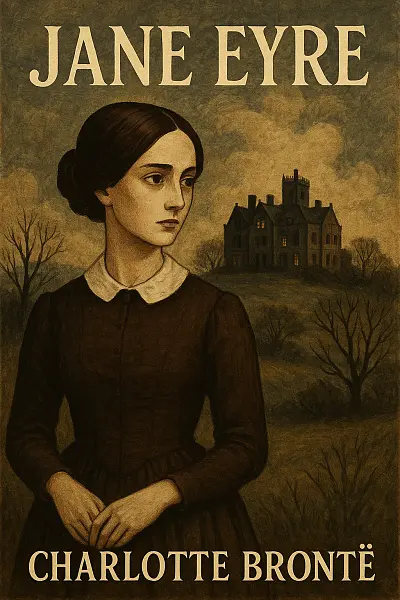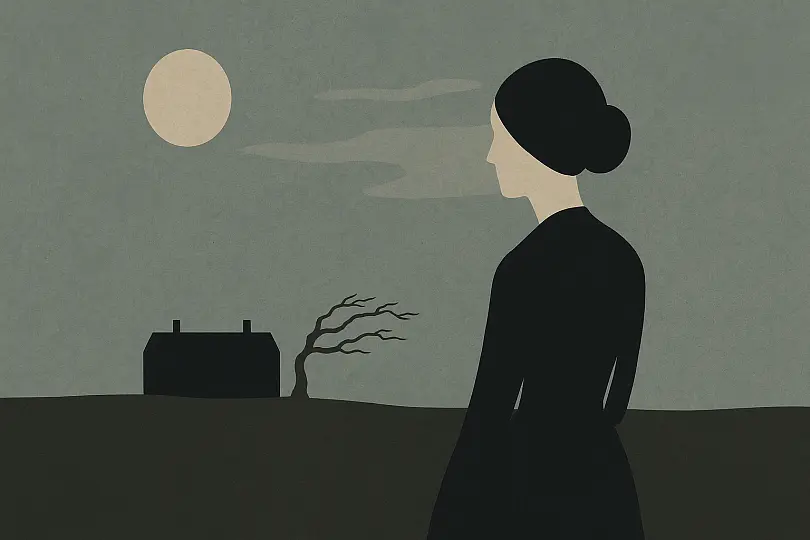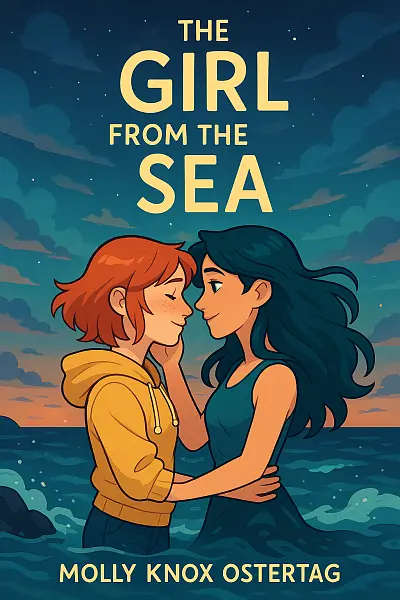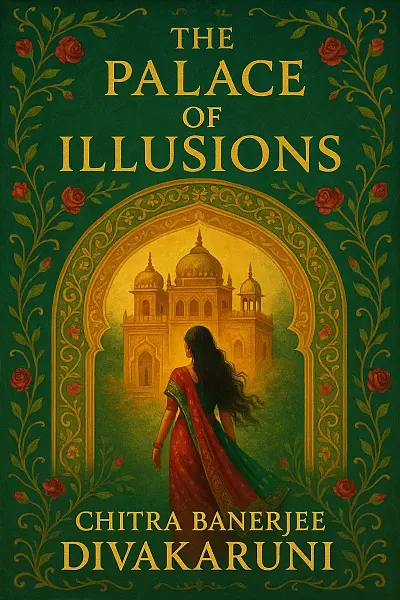
Jane Eyre
by: Charlotte Brontë
Jane Eyre, a fiercely independent orphan, endures a harsh upbringing in her aunt's cold, unloving home before settling into life as a governess at Thornfield Hall. Just as she starts to carve out a place for herself, Jane’s world flips when she meets the enigmatic, emotionally charged Mr. Rochester.
Drawn into a passionate connection, Jane finds herself confronting not only Rochester’s dark secrets but also her own need for autonomy and moral integrity. Torn between head and heart, she faces a huge question: can she stay true to herself and still find love? The air is thick with gothic tension and unspoken longing.
"“To remain true to oneself when the world demands surrender is the quietest form of courage.”"
Let's Break This Down
The Author's Voice
Atmosphere
Moody, evocative, and layered with gothic undertones. Expect windswept moors, shadowy halls, and a sense of haunting isolation. The emotional weather of the novel matches the physical landscape—charged with longing, unease, and a touch of romantic danger. Every setting feels heavy with secrets and possibility, drawing you into both Jane’s inner and outer worlds.
Prose Style
Elegant, introspective, and richly descriptive. Brontë crafts sentences with a precise, almost poetic flair, weaving in vivid imagery and psychological depth. There’s an honesty and boldness to Jane’s first-person voice—it’s intimate, confessional, and deeply personal. Expect long, thoughtful passages that reveal as much about the narrator’s soul as about the events themselves.
Pacing
Measured, deliberate, and immersive. The story unfolds at a stately pace, allowing relationships and tensions to simmer. While it isn’t breakneck, you’ll find a satisfying build-up—lingering on moments of reflection, moral struggle, and emotional crescendo. When the plot turns, it’s dramatic and genuinely earned.
Dialogue
Sharp, characterful, and often charged with subtext. Conversations aren’t just exchanges—they’re battles of wit, honesty, and sometimes power. Expect eloquent debates on morality, love, and independence, with characters who reveal their motives gradually, not all at once.
Character Voice
Strong, fiercely individual, and emotionally resonant. Jane narrates with steel and sensitivity—her inner strength, vulnerability, and complexity shine through. Secondary characters are memorable and distinct, each written with their own cadence and motives. You’ll feel connected, whether you love them, hate them, or want to unravel their mysteries.
Mood & Feel
Intense, romantic, reflective, and just a bit wild. There’s an undercurrent of rebellion and yearning that pulses throughout. The novel captures the ache of forbidden love, the loneliness of being an outsider, and the triumph of self-realization. If you crave books that leave you haunted and hopeful at once, this style pulls you in completely.
Key Moments
- 🔥 The “Reader, I married him” mic-drop—pure literary swagger
- Bleak Red Room punishment that haunts Jane’s childhood dreams
- Mysterious laughter echoing through Thornfield’s halls—gothic chills, anyone?
- Jane’s fierce showdown with Mr. Rochester: “Do you think I am an automaton?” She’s got fire
- Bertha Mason revealed—the attic secret that rips everything apart
- Love tangling with independence—Jane won’t settle, even when hearts are on the line
- Brontë’s wild moors: windswept landscapes matching Jane’s emotions beat-for-beat

A fierce quest for self-worth amidst gothic secrets and forbidden love
What Readers Are Saying
Right for You If
If you love classic literature with a strong, independent heroine, Jane Eyre is totally your vibe. Seriously, if you dig stories about women beating the odds and standing up for themselves (especially in a time when that wasn’t exactly encouraged), this one’s a must-read. Romance fans will swoon over the slow-burn love story—it's not all flowers and rainbows, but there's tension, mystery, and genuine feels.
Are you into gothic vibes and moody atmospheres? The whole creepy mansion/secrets lurking in the attic thing is top tier here. Plus, if you like books that tackle big themes like social class, morality, and finding your place in the world, you’ll be hooked.
But honestly, if you’re someone who wants super fast-paced plots or non-stop action, you might get a little restless. Brontë’s writing is lovely but it’s Victorian, so there are long descriptions and some old-fashioned language. If that doesn’t vibe with you (or you just hate anything with “love” in the summary), maybe skip this one.
Oh, and if you get nerdy about character development and enjoy seeing characters wrestle with complex emotions, Jane’s journey will give you everything you want. If you’re more about plot than feelings, or you can’t handle a bit of melodrama, this might not be your thing.
So in short:
- Love strong heroines, gothic romance, or big emotional journeys? Give it a go!
- Prefer action-packed or ultra-modern stuff? Maybe grab something else instead.
- Drawn to rich prose and layered themes? You’ll be obsessed.
- Not into 19th-century stories or classic lit? Probably not your cup of tea.
At the end of the day, Jane Eyre is one of those books that either sweeps you away or just isn’t for you—and that’s totally okay.
What You're Getting Into
Step into the hauntingly beautiful world of Jane Eyre, where a fiercely independent orphan carves out her own destiny against the bleak backdrop of Victorian England.
- When Jane lands a position as a governess at the mysterious Thornfield Hall, she’s drawn into a web of secrets and forbidden emotions that challenge everything she knows.
- With its mix of moody Gothic vibes, slow-burn romance, and a heroine you’ll want to cheer for, this is the perfect read if you love stories about resilience, self-discovery, and daring to defy the odds.
Characters You'll Meet
-
Jane Eyre: Spirited, principled orphan who grows into a fiercely independent woman. Her quest for love and self-respect anchors the entire story.
-
Edward Rochester: Complicated, brooding master of Thornfield Hall. His secretive past and evolving relationship with Jane push both characters to confront their true selves.
-
St. John Rivers: Stoic and ambitious clergyman who offers Jane a different vision of duty and purpose. His proposal challenges Jane’s ideas about love, sacrifice, and independence.
-
Mrs. Reed: Harsh aunt who raises Jane in a neglectful, loveless environment. Her cruelty amplifies Jane’s longing for belonging and self-worth.
-
Bertha Mason: Mysterious, tragic woman hidden at Thornfield; Rochester’s wife whose existence threatens Jane’s happiness. Symbolizes the destructive power of secrets and repression.
More Like This
If you ever found yourself captivated by the independent spirit and simmering tension of Pride and Prejudice, you'll be swept away by Jane Eyre. The fierce intellect and self-assured dignity Jane displays echo Elizabeth Bennet’s refusal to be defined by her social station, yet Brontë steers her heroine onto a darker, tempestuous path filled with gothic mystery and emotion—think of it as Austen, but with shadowy corridors and secrets whispering from behind locked doors.
Fans of Rebecca by Daphne du Maurier will recognize a familiar sense of brooding atmosphere and the eerie, almost sentient presence of a grand, secluded estate. Both novels revolve around a young woman teetering between self-effacement and self-discovery, grappling with secrets that threaten to unravel everything. The romantic tension laced with suspicion and melancholy in Jane Eyre may just give you the same spine-tingling satisfaction as Manderley’s haunted halls.
On screen, the stormy dynamic between Jane and Mr. Rochester often brings to mind The Handmaid’s Tale (the acclaimed TV series), especially in the way the female protagonists quietly rebel against confining, patriarchal societies. There’s a subtly defiant energy in both worlds, as women chart their own destiny—all while resisting forces determined to silence them. Both stories are compelling in their unflinching look at resilience and hope blossoming in the most oppressive environments.
Critic's Corner
What does it mean to claim your own destiny in a world determined to repress you? Jane Eyre forces us to ask: Is self-respect worth loneliness, and at what cost do we pursue love without losing ourselves? Brontë’s gothic tapestry—set against a moor-lit world brimming with secrets—invites us to walk the razor’s edge between yearning and autonomy, comfort and integrity. Few novels so unflinchingly probe the wilderness of the soul.
Brontë’s prose is intensely vivid—lush yet disciplined, passionate without tipping into melodrama. The first-person narrative is an inspired choice: Jane’s voice, frank yet deeply sensitive, anchors every scene, letting us inhabit both her inner strife and her environment’s haunting textures. Brontë excels at psychological realism: Jane’s headstrong resistance, cool observations, and stinging self-doubt simmer through each carefully chosen word. Brontë also plays deftly with genre conventions, blending the gothic (creeping corridors, ominous laughter) with a raw, almost proto-modern introspection. The pacing can lag—especially in sections thick with religious reflection or social discourse—but the novel largely avoids Victorian bloat. Brontë’s linguistic mastery is unmistakable: descriptions sing, dialogue crackles, and the emotional urgency is magnetic.
At its heart, Jane Eyre wrestles with freedom, equality, and authenticity. It’s not just a love story; it’s a woman’s declaration that her soul matters, even when the world insists otherwise. The tension between spiritual integrity and human desire—Jane’s need to be loved but also her unwillingness to compromise her values—remains electrifying. Brontë’s exploration of power dynamics (in class, gender, and romance) has not aged: Jane’s refusal to be either victim or ornament speaks sharply to modern readers confronting their own boundaries. The novel also interrogates forgiveness, moral ambiguity, and the capacity for self-transformation. Critics have pointed to its colonial blind spots—its treatment of Bertha Mason and “otherness”—and these must be acknowledged as both artifacts of, and blemishes on, a radical text. Yet Jane’s insistence on her own worth, regardless of anyone’s opinion, is what gives the book its enduring resonance.
Within the Victorian canon, Brontë’s achievement stands apart: it’s more psychologically daring than Austen, more intimate than Dickens, and injects female desire into a landscape traditionally policed by patriarchy. The gothic setting is no mere backdrop but a crucible for transformation, foreshadowing later writers like du Maurier. Jane Eyre also set a precedent for the bildungsroman, its coming-of-age arc informing generations of writers exploring inner life against harsh realities.
The verdict? Brontë’s masterpiece occasionally meanders and contains troubling colonial attitudes, but its innovative voice, emotional honesty, and fearless moral inquiry are seismic. For anyone craving a novel that challenges, disturbs, and endures, Jane Eyre is essential reading—both a product of its time and a timeless outcry for selfhood.
Community Thoughts
I didn’t even mean to read the whole thing in one night but then Jane was out in the storm and Rochester was yelling and suddenly it was 4 AM and my coffee was gone and my heart was SHATTERED. What did you do to me, Brontë?!
i legit lost sleep over bertha mason pacing the attic at night. every creak in my house became her footsteps. this book really knows how to mess with your head and routine.
i couldn't stop picturing bertha in the attic, creeping through the halls at night. it messed with my head and i kept checking my own doors before bed. thanks, charlotte, for the new sleep paranoia.
ok but like bertha in the attic? still thinking about her at 3am, what if there’s always someone watching from the walls? thanks for that, brontë, guess I’m never sleeping again
That red room scene? Still thinking about it at 3 am, thanks Charlotte. I swear my heart rate tripled, and every shadow in my room looked ready to start reciting Victorian ghost stories.
Leave Your Review
Local Take
Why It Matters
Absolutely! Could you please specify which country or cultural context you'd like me to focus on for this Jane Eyre analysis?
Food for Thought
Notable Achievement:
Jane Eyre is celebrated as one of the first novels to explore a woman's inner moral and spiritual development, and its fiercely independent heroine has inspired generations of readers and countless adaptations in literature, film, and art.
Cultural Impact Highlights:
- Jane Eyre redefined the possibilities of the Gothic romance and bildungsroman genres, making space for complex female protagonists.
- Its influence can be seen everywhere—from inspiring feminist literary criticism to serving as a touchstone in debates about class, gender, and individualism in Victorian literature.
Like what you see? Share it with other readers







